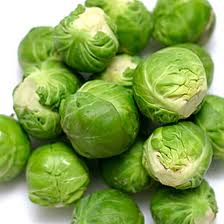 While shunned by many, Brussels Sprouts are one of the most nutritious and delicious members of the cabbage family. Easy to prepare and eat, Brussels Sprouts are a slow growing vegetable which first comes to life in the early spring and matures towards the end of summer. With this said, Brussels Sprouts have been known to sprout during the wintertime, even when there is snow on the ground. For this reason, it is not uncommon to find Brussels Sprouts growing in most regions of North America.
While shunned by many, Brussels Sprouts are one of the most nutritious and delicious members of the cabbage family. Easy to prepare and eat, Brussels Sprouts are a slow growing vegetable which first comes to life in the early spring and matures towards the end of summer. With this said, Brussels Sprouts have been known to sprout during the wintertime, even when there is snow on the ground. For this reason, it is not uncommon to find Brussels Sprouts growing in most regions of North America.
Key Nutrients
Brussels sprouts are high in vitamin C, vitamin K, beta carotene and folic acid. Being related to cabbage, Brussels sprouts are a great source of dietary fiber as well.
Health Benefits
Beta Carotene – Beta carotene has been well-studied as a dietary antioxidant. Carotenoids are also thought to benefit eye health. Some studies support a role of carotenoids in reducing macular degeneration.
Vitamin B12 – Vitamin B12, or folic acid, helps to preserve neurological function and DNA synthesis. It also plays a key role in the health of red blood cells. The nervous system relies on vitamin B12 for proper function as well.
Vitamin C – Regular consumption of foods rich in vitamin C helps the body develop resistance against infections and scavenges harmful, pro-inflammatory free radicals. Vitamin C also helps to prevent respiratory problems such as asthma and lung cancer. Vitamin C has been shown to lower blood pressure, and therefore lessen the probability of hypertension.
Vitamin K – Vitamin-K plays an important role in bone metabolism by promoting osteotrophic activity in bone cells. Vitamin K also acts to clot open wounds and prevent excessive bleeding. Healthy vitamin K levels lower the release of the glycoprotein interleukin-6, a marker of inflammation within the body.
Season
Brussels Sprouts mature in the late fall and early winter, and store very well. For this reason, it is not hard to find Brussels Sprouts through the winter months as well.
Nutrition Information
Per 1 cup (88 grams):
Calories (cKal): 38
Protein (grams): 2.97
Total Fat (grams): .26
Carbohydrates (grams): 7.88
Fiber (grams): 3.3
Buying and Storing
When buying Brussels Sprouts, make sure the sprouts are green in color and free of dirt and yellow discoloration. To store, place the Brussels Sprouts in a loosely sealed plastic bag in the refrigerator for up to one week. Before serving, make sure to wash the sprouts under cold water for at least 30 seconds, then remove the outer shell.
Best Way to Add to Diet
Brussels Sprouts can be cooked whole or sliced. To enjoy the full flavor of this vegetable, make sure to not overcook them, since this can cause an off taste and loss of flavor. To assure they cook whole evenly, make sure to cut an X in the center of the sprout. As a general rule, cook the whole sprouts for seven to ten minutes to make sure you do not overcook them. If the sprouts turn slightly yellow or grey when cooking, chances are you have overcooked them. Another great way to cook Brussels Sprouts is to slice them thinly. Then, add the sliced sprouts to a sauté pan along with a small amount of olive oil and herbs. Cook for three minutes, then deglaze the pan with red wine vinegar.
Brussels Sprout Recipe

 Not Sure What Healthy Foods To Eat?
Not Sure What Healthy Foods To Eat? This week we take a look at one of my favorite healthy foods...the mighty Avocado.
This week we take a look at one of my favorite healthy foods...the mighty Avocado.
No comments yet.